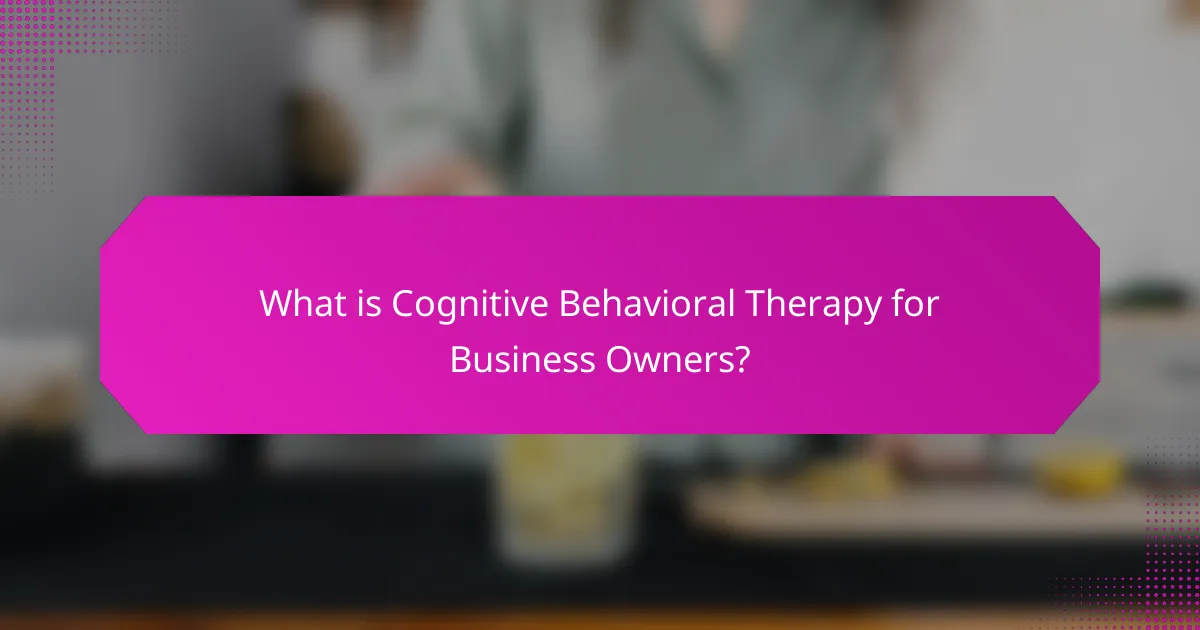Cognitive Behavioral Therapy (CBT) offers business owners effective techniques to enhance decision-making and manage stress. This article explores key methods such as cognitive restructuring, behavioral activation, and problem-solving skills. It highlights the benefits of improved emotional resilience and productivity. Case studies illustrate tangible outcomes, including increased revenue and reduced burnout, showcasing the practical impact of CBT on entrepreneurial success.

What is Cognitive Behavioral Therapy for Business Owners?
Cognitive Behavioral Therapy (CBT) for business owners focuses on addressing negative thought patterns that impact decision-making and stress management. Techniques include cognitive restructuring, mindfulness, and behavioral activation. Benefits encompass improved emotional resilience, enhanced problem-solving skills, and reduced anxiety levels. Case studies demonstrate increased productivity and better work-life balance among entrepreneurs who have implemented CBT strategies.
How does CBT differ from other therapeutic approaches?
Cognitive Behavioral Therapy (CBT) differs from other therapeutic approaches by focusing on changing negative thought patterns to influence behavior. Unlike psychodynamic therapy, which explores unconscious processes, CBT is structured and goal-oriented. It emphasizes the present, making it particularly effective for business owners facing stress and decision-making challenges. Additionally, CBT often utilizes specific techniques such as cognitive restructuring and behavioral activation, which are less prevalent in approaches like humanistic therapy. This targeted methodology allows for measurable progress, appealing to those seeking practical solutions.
What are the foundational principles of CBT?
Cognitive Behavioral Therapy (CBT) is grounded in several foundational principles. These include the concept that thoughts, feelings, and behaviors are interconnected, and that changing negative thought patterns can lead to changes in feelings and behaviors. CBT emphasizes the importance of identifying and challenging distorted thinking, fostering self-awareness, and utilizing practical strategies to cope with challenges. Additionally, it focuses on the present rather than past experiences, encouraging proactive problem-solving and skill development.

What are the core techniques used in CBT for business owners?
Cognitive Behavioral Therapy (CBT) techniques for business owners include cognitive restructuring, behavioral activation, and problem-solving skills. These methods help in identifying negative thought patterns, encouraging proactive behavior, and effectively addressing challenges.
Cognitive restructuring allows business owners to challenge and reframe unhelpful thoughts, promoting a more positive mindset. Behavioral activation focuses on engaging in activities that align with personal values and goals, enhancing motivation and productivity. Problem-solving skills equip owners with strategies to tackle obstacles systematically, leading to better decision-making.
Implementing these techniques can lead to improved mental well-being, increased resilience, and enhanced business performance. Case studies show that business owners who utilize CBT techniques report reduced stress levels and greater satisfaction in their professional lives.
How can cognitive restructuring improve decision-making?
Cognitive restructuring enhances decision-making by challenging negative thought patterns. This technique promotes a more rational and balanced perspective, leading to better choices. Improved cognitive flexibility allows business owners to evaluate options critically, reducing impulsive decisions. As a result, applying cognitive restructuring can significantly enhance strategic thinking and problem-solving abilities.
What steps are involved in cognitive restructuring?
Cognitive restructuring involves several key steps to help business owners modify negative thought patterns. First, identify negative thoughts or cognitive distortions. Second, challenge these thoughts by examining evidence for and against them. Third, replace negative thoughts with more balanced and rational alternatives. Finally, practice these new thoughts to reinforce positive thinking patterns.
What role does behavioral activation play in CBT?
Behavioral activation is a key component of Cognitive Behavioral Therapy (CBT) that encourages individuals to engage in meaningful activities. This approach helps business owners combat feelings of depression and anxiety by promoting proactive behavior. It emphasizes the connection between actions and emotions, leading to improved mental health and productivity. By identifying and scheduling enjoyable or fulfilling tasks, business owners can experience enhanced motivation and a greater sense of control over their work environment.
How can business owners implement behavioral activation?
Business owners can implement behavioral activation by setting clear, achievable goals and tracking progress. This technique encourages engagement in positive activities to combat negative emotions. Start by identifying specific behaviors to activate, such as networking or skill development. Schedule these activities and review outcomes regularly to adjust strategies. Incorporating feedback mechanisms enhances motivation and accountability, leading to improved mental well-being and productivity.
What are the techniques for managing anxiety and stress?
Cognitive Behavioral Therapy (CBT) techniques effectively manage anxiety and stress for business owners. Techniques include cognitive restructuring, exposure therapy, and mindfulness practices. Cognitive restructuring helps identify negative thought patterns, while exposure therapy gradually confronts stressors. Mindfulness practices enhance emotional regulation, promoting resilience. Implementing these techniques can lead to improved decision-making and overall business performance.

What benefits can business owners expect from CBT?
Business owners can expect significant benefits from Cognitive Behavioral Therapy (CBT) including improved decision-making, enhanced stress management, and better work-life balance. CBT equips them with practical techniques to challenge negative thought patterns, fostering a positive mindset. As a result, business owners often experience increased productivity and motivation. Additionally, CBT can lead to stronger interpersonal relationships within teams, promoting a healthier work environment.
How does CBT enhance emotional resilience?
Cognitive Behavioral Therapy (CBT) enhances emotional resilience by teaching business owners to identify and reframe negative thought patterns. This process fosters better coping strategies, enabling them to manage stress effectively. As a result, they develop a more positive outlook and improved problem-solving skills. Research shows that individuals practicing CBT report higher levels of emotional stability and adaptability in challenging situations.
What impact does CBT have on productivity?
Cognitive Behavioral Therapy (CBT) significantly enhances productivity by improving focus and reducing anxiety. Business owners often experience stress that hampers decision-making. CBT techniques help identify negative thought patterns and replace them with constructive ones, leading to better time management and efficiency. Studies show that individuals who engage in CBT report increased motivation and a clearer mindset, directly impacting their productivity levels.
In what ways can CBT improve leadership skills?
Cognitive Behavioral Therapy (CBT) enhances leadership skills by improving emotional regulation, decision-making, and communication. It helps leaders identify and challenge negative thought patterns, fostering resilience and adaptability. As a result, leaders become more effective in managing teams and navigating challenges.

What unique attributes make CBT effective for entrepreneurs?
Cognitive Behavioral Therapy (CBT) is effective for entrepreneurs due to its unique attributes that enhance emotional resilience and decision-making. One unique attribute is its focus on cognitive restructuring, which helps entrepreneurs identify and challenge negative thought patterns that can hinder their performance. Additionally, CBT’s structured approach allows for measurable progress, enabling business owners to track improvements in anxiety and stress management. This adaptability to individual needs further distinguishes CBT, making it a tailored solution for the diverse challenges entrepreneurs face.
How does CBT address the specific challenges faced by business owners?
Cognitive Behavioral Therapy (CBT) effectively addresses challenges faced by business owners by providing practical strategies to manage stress and enhance decision-making. CBT techniques, such as cognitive restructuring, help owners identify negative thought patterns that hinder performance. Additionally, mindfulness practices integrated into CBT can improve focus and resilience, enabling better handling of setbacks. Case studies show that business owners utilizing CBT report increased productivity and improved emotional well-being, illustrating its unique benefits in the entrepreneurial context.
What is the role of self-reflection in CBT for entrepreneurs?
Self-reflection plays a crucial role in Cognitive Behavioral Therapy (CBT) for entrepreneurs by fostering self-awareness and identifying thought patterns. This process allows business owners to recognize cognitive distortions that impact decision-making and stress management. By engaging in self-reflection, entrepreneurs can develop strategies to challenge negative beliefs, enhance problem-solving skills, and improve emotional resilience. Ultimately, this practice leads to more effective leadership and a healthier work-life balance.

What are some rare but notable outcomes of CBT?
Cognitive Behavioral Therapy (CBT) can lead to rare but notable outcomes for business owners, such as enhanced decision-making clarity and improved resilience under stress. These outcomes, while not common, can significantly impact a business owner’s ability to navigate challenges. For instance, some individuals report a transformation in their leadership style, fostering a more positive work environment. Additionally, CBT may facilitate innovative problem-solving approaches, helping owners to think outside traditional frameworks. These unique benefits underscore the potential of CBT in enhancing both personal and professional growth.
Can CBT lead to long-term behavioral changes?
Yes, Cognitive Behavioral Therapy (CBT) can lead to long-term behavioral changes for business owners. By addressing negative thought patterns, CBT helps individuals develop healthier coping mechanisms and decision-making strategies. Studies indicate that consistent application of CBT techniques can result in sustained improvements in emotional regulation and stress management. This, in turn, enhances overall business performance and personal well-being.
What unexpected benefits have business owners reported?
Business owners have reported unexpected benefits from Cognitive Behavioral Therapy (CBT) that enhance both personal and professional aspects. Improved emotional resilience is a common outcome, enabling better stress management. Enhanced decision-making skills arise from clearer thinking patterns, leading to more effective business strategies. Increased productivity often follows as owners learn to overcome mental barriers. Additionally, stronger interpersonal relationships develop, fostering better teamwork and communication within their organizations. These benefits showcase the transformative potential of CBT beyond traditional mental health applications.

What are some case studies demonstrating CBT effectiveness?
Cognitive Behavioral Therapy (CBT) has proven effective for business owners in various case studies. One notable example is a study involving small business owners who reported a 30% increase in productivity after implementing CBT techniques to manage stress and anxiety. Another case involved a startup founder who utilized CBT to improve decision-making skills, leading to a 25% growth in revenue over six months. Additionally, a group of entrepreneurs participated in a CBT program, resulting in enhanced resilience and a 40% reduction in burnout symptoms. These case studies highlight the tangible benefits of CBT for business owners, including improved performance and mental well-being.
What lessons can be learned from successful business owners who used CBT?
Successful business owners who used Cognitive Behavioral Therapy (CBT) learned to manage stress and enhance decision-making. They reported improved emotional resilience and better communication skills. Techniques like cognitive restructuring helped them challenge negative thoughts, leading to increased productivity. Case studies show that consistent CBT practice fosters a growth mindset, enabling entrepreneurs to navigate challenges effectively.
How did CBT help in crisis management scenarios?
Cognitive Behavioral Therapy (CBT) effectively aids crisis management by providing structured techniques for emotional regulation and problem-solving. Business owners can utilize CBT strategies to manage stress, enhance decision-making, and improve communication during crises. These techniques foster resilience, allowing individuals to reframe negative thoughts and focus on actionable solutions. Case studies reveal that businesses employing CBT during crises reported reduced anxiety and improved outcomes, demonstrating its significant benefits in high-pressure situations.

What are the best practices for implementing CBT in a business context?
Implementing Cognitive Behavioral Therapy (CBT) in a business context requires structured techniques that enhance employee well-being. Key practices include training managers in CBT principles, integrating mindfulness techniques, and providing resources for mental health support.
Offering workshops focused on cognitive restructuring helps employees identify and challenge negative thoughts. Additionally, establishing a supportive environment encourages open discussions about mental health. Regular assessments of employee mental health can inform necessary adjustments to programs.
These practices lead to improved employee morale, reduced stress levels, and increased productivity. Case studies show businesses that adopt CBT techniques experience significant benefits, including lower turnover rates and enhanced team collaboration.
How can business owners tailor CBT techniques to their specific needs?
Business owners can tailor Cognitive Behavioral Therapy (CBT) techniques by identifying specific challenges and customizing strategies accordingly. For instance, they can focus on goal-setting to enhance productivity or employ cognitive restructuring to address negative thought patterns.
Additionally, integrating mindfulness practices into CBT can help manage stress effectively. Case studies show that personalized CBT approaches lead to improved decision-making and employee engagement. By adapting techniques to their unique business context, owners can maximize the benefits of CBT.
What common mistakes should be avoided when using CBT?
Common mistakes to avoid when using Cognitive Behavioral Therapy (CBT) include neglecting personalized approaches, overlooking the importance of homework assignments, and failing to track progress. Business owners may also misinterpret CBT techniques, applying them inconsistently or without proper guidance. Additionally, underestimating the need for emotional awareness can hinder effectiveness.
What expert insights can enhance the effectiveness of CBT for business owners?
Expert insights can significantly enhance the effectiveness of Cognitive Behavioral Therapy (CBT) for business owners. Tailoring techniques to address specific challenges, such as stress management and decision-making, can lead to improved outcomes.
Incorporating mindfulness practices into CBT can enhance emotional regulation, promoting resilience in high-pressure situations. Research indicates that integrating these techniques can reduce anxiety levels by up to 30%.
Utilizing case studies that demonstrate successful applications of CBT in business contexts can provide practical examples, making the therapy more relatable and actionable.
Regular feedback and adjustment of therapeutic approaches based on individual progress can optimize the effectiveness of CBT, ensuring that business owners receive personalized support.


